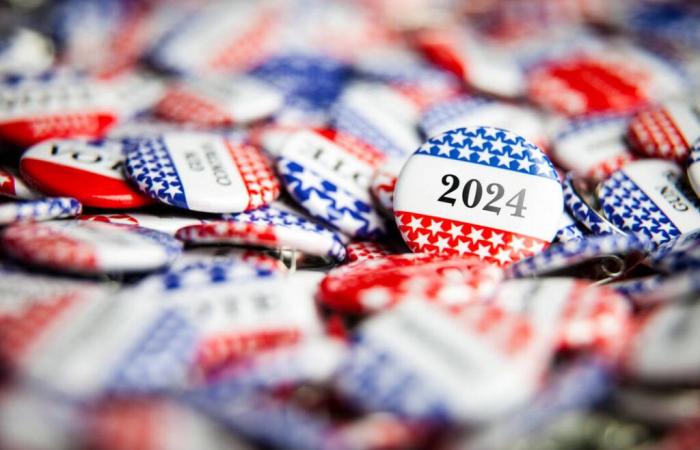Some of the closest races to watch on Election Day will be in Central Indiana, though two seats in Southern Indiana are also competitive. (Getty Images)
Today is the final day of voting for Hoosiers after more than a year of debates, advertisements, fundraising, polls and endorsements. If you haven’t already cast your ballot, here are the races you’ll be seeing.
Indiana is a reliably red state and will likely cast its electoral college votes for former President Donald Trump, a Republican, who is running against Vice President Kamala Harris, a Democrat.
But races further than down the line could still yield surprises, with several Democratic hopefuls vying to upset the Republican trifecta of power.
The GOP has led the Hoosier State for two decades and currently holds a supermajority in both legislative chambers as well as the governor’s office. Changing the balance of power in the House would only require Democrats to flip four seats — mostly those in Central Indiana — but means they’d have to retain all their current seats, including a competitive district along the Ohio River.
Supporters also point to favorable polling that shows a narrowing race between the two leading gubernatorial nominees, which has attracted unanticipated funding from national players.
Read on to see what the stakes are for this Election Day.
Statewide races
Every reputable poll puts U.S. Sen. Mike Braun, a Republican, ahead of Democrat Jennifer McCormick, as summarized by FiveThirtyEight. But national Democratic party leaders point to their own poll placing McCormick within “striking distance” of Braun, who has just a three-point lead. That poll was weeks ago, though.
Another sign of a potentially tight race: about $2 million in donations from their respective governors associations, which typically don’t interfere in safe races.
The Republican nominee has two additional factors working against him: his controversial running mate Micah Beckwith and Libertarian gubernatorial nominee Donald Rainwater. But he does have a Trump endorsement on his side.
Beckwith, a self-described Christian nationalist, has rankled some Hoosiers with anti-LGBTQ comments and characterized the female-led Democratic ticket as having a “Jezebel spirit.”
Rainwater, on the other hand, had unprecedented success during his 2020 gubernatorial run. He presents enough of a threat that Republican party officials approved attack mailers calling Rainwater a “deadbeat loser,” citing unpaid child support from nearly two decades ago. Rainwater has said that the financial troubles are largely “resolved.”
Such momentum hasn’t carried over to the two other statewide races: one for the U.S. Senate and another for attorney general.
Current U.S. Rep. Jim Banks, the Republican nominee to succeed Braun in the Senate, was comfortable enough with his presumed lead to pass on the debate and has largely stayed quiet, aside from his typical tweets.
He faces Democrat Valerie McCray and Libertarian Andrew Horning this Election Day.
Meanwhile, Indiana Attorney General Todd Rokita, a Republican, has a challenge from Democrat Destiny Wells.
Polling favors Rokita and neither candidate has attracted the same national attention — in terms of national funding — as the governor’s race. However, Sabato’s Crystal Ball rates the race as “Likely Republican,” acknowledging the controversial actions of Rokita that might turn away voters.
Most recently, Rokita signed onto an effort to verify the citizenship status of nearly 600,000 registered voters and he has been reprimanded by the Indiana Supreme Court for his comments about Dr. Caitlin Bernard, a doctor who made national headlines after she performed an abortion on a 10-year-old rape victim.
Bernard was fined by the state’s medical licensing board for publicly sharing that story. The state’s highest court is still considering various other complaints against Rokita related to his in-office conduct.
Other Election Day races
Further down the ballot, both major parties are eyeing several competitive seats around the state and pouring in their financial resources.
Over one-third of seats in the 100-member House are uncontested, meaning that only one candidate will appear on the ballot. In the Senate, where only half of the 50 positions are up this Election Day, nearly half of those seats, or 48%, are uncontested.
On the Senate side, party dollars for Republicans have been directed toward incumbent Senators Scott Baldwin, of Noblesville; Cyndi Carrasco, of Indianapolis; and Aaron Freeman, of Indianapolis.
The three Central Indiana lawmakers will be up against Democrats Joel Levi, Suzanne Fortenberry and Katrina Owens, respectively. Democrats are unlikely to break the Republican supermajority in the Senate, where the minority party holds just ten seats — seven short of the minimum needed to gain power.
The House Republican caucus spent more than $1 million in the month of October, over half of which went to just two seats: Clark County’s Scott Hawkins and Rep. Dave Hall, of Jackson County.
Hawkins lost his 2022 bid for the Jeffersonville seat by a few hundred votes while Hall’s margin of victory that cycle was just 74 votes.
Hawkins will face Democratic Rep. Wendy Dant Chesser, who was sworn in after former Rep. Rita Fleming stepped down after the May primaries.
Democrat Thomas Horrocks is challenging Hall for his seat, which includes parts of Monroe County and all of Brown County.
House Republicans have also dedicated resources to Rep. Becky Cash, of Zionsville, and Hamilton County’s Danny Lopez. The Democratic challengers in those races are Tiffany Stoner and Matt McNally, respectively.
Lopez and McNally are vying to succeed Rep. Jerry Torr, a Republican who retired earlier this year. Another General Assembly retirement has created a potential opportunity for Democrats: the seat of former Rep. Donna Shaibley, a Republican.
The two men competing to be her successor are Democrat Josh Lowry and Republican Hunter Smith.
Another race to watch could include Republican Sen. Mike Young, who has long served the residents on the west side of Indianapolis and will appear on the ballot against Jessica McCormick, a Democratic City-County Councilor.
The Indiana Capital Chronicle is an independent, not-for-profit news organization that covers state government, policy and elections.






